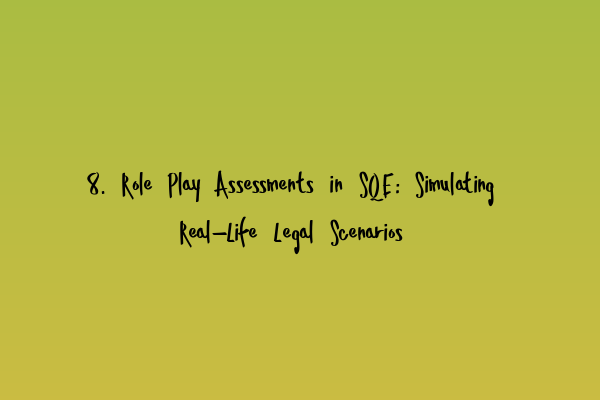Role Play Assessments in SQE: Simulating Real-Life Legal Scenarios
In the Solicitors Qualifying Examination (SQE), students are evaluated not only on their theoretical knowledge of the law but also on their ability to apply that knowledge to real-life legal scenarios. This is where role play assessments come into play. Role play assessments aim to simulate real-life legal situations, allowing students to demonstrate their practical skills and competence in a controlled environment.
In this article, we will delve into the importance of role play assessments in the SQE and how they can help aspiring solicitors develop the necessary skills for a successful legal career.
1. Realistic Legal Scenarios
Role play assessments in the SQE are designed to mirror real-life legal scenarios that aspiring solicitors may encounter in their career. These scenarios can cover a wide range of legal practice areas, such as contract law, criminal law, family law, or commercial law. By experiencing these scenarios during their training, students are better prepared to handle similar situations when they enter the legal profession.
For example, a role play assessment may involve interacting with a client who needs legal advice on a contract dispute. The student will need to listen attentively, ask relevant questions, identify legal issues, and provide appropriate advice. Through these simulations, students develop their analytical, communication, and problem-solving skills, which are essential for a solicitor’s everyday work.
2. Application of Legal Knowledge
Role play assessments require students to apply their legal knowledge and understanding to solve real-time problems. This is a crucial aspect of legal practice, as solicitors must be able to analyze complex legal issues and provide practical solutions for their clients.
By engaging in role play assessments, students learn to analyze legal problems, spot relevant legal issues, and apply the appropriate legal principles to resolve the situation. This not only enhances their understanding of the law but also helps them develop the critical thinking skills necessary for success in the legal profession.
3. Communication and Interpersonal Skills
Effective communication and interpersonal skills are essential for solicitors to build strong relationships with clients, colleagues, and other stakeholders. Role play assessments provide an opportunity for students to develop and refine these skills in a simulated environment.
During the role play assessments, students must effectively communicate their advice, listen actively to client concerns, and respond appropriately to challenging situations. They also learn to adapt their communication style to suit different clients and situations, such as explaining complex legal concepts in a clear and understandable manner.
4. Professional Conduct
Professional conduct is a fundamental aspect of legal practice. Solicitors are expected to adhere to a set of ethical standards and maintain professionalism in all their interactions. Role play assessments allow students to practice and demonstrate their understanding of professional conduct in a realistic setting.
Through role play assessments, students learn to consider ethical implications, maintain client confidentiality, and handle situations with integrity and professionalism. This hands-on experience helps students internalize the importance of professional conduct and prepares them for the ethical challenges they may face in their legal careers.
5. Feedback and Improvement
Role play assessments provide an invaluable opportunity for students to receive feedback on their performance and identify areas for improvement. Feedback allows students to reflect on their strengths and weaknesses, identify gaps in their knowledge or skills, and take necessary steps to enhance their abilities.
By analyzing feedback from role play assessments, students can focus on improving specific areas, such as legal research, communication, or problem-solving. This targeted approach to development ensures that students are constantly striving for improvement and are better prepared for the challenges they may face in the SQE and their future legal career.
Overall, role play assessments play a vital role in the SQE by simulating real-life legal scenarios, encouraging the application of legal knowledge, developing communication and interpersonal skills, reinforcing professional conduct, and providing invaluable feedback for improvement.
If you are preparing for the SQE, be sure to check out these related articles:
- SQE Strategies: Proven Tactics to Ace the Solicitors Qualifying Examination
- SQE Case Studies: Applying Knowledge in Real-Life Scenarios
- Solicitors Qualifying Examination (SQE): Your Gateway to Legal Practice
- Mastering Time Management in SQE: Strategies for Efficient Exam Completion
- Analyzing Mock Results for SQE: Identifying Areas of Improvement
